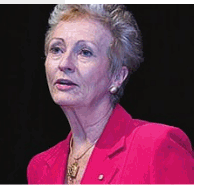|
|
|
|
|
|
|
News & Views item - November 2010 |
![]() Denise
Bradley Talks to Times Higher Education International About TEQSA.
(November 12, 2010)
Denise
Bradley Talks to Times Higher Education International About TEQSA.
(November 12, 2010)
 This week's Times Higher Educational International
has devoted a two page spread to an interview by Simon Baker with Denise Bradley,
Vice-Chancellor emeritus of The University of South Australia, leader of the
2008 Review of Australian Higher Education and currently the interim chair of
the Tertiary Education Quality and Standards Agency (TEQSA).
This week's Times Higher Educational International
has devoted a two page spread to an interview by Simon Baker with Denise Bradley,
Vice-Chancellor emeritus of The University of South Australia, leader of the
2008 Review of Australian Higher Education and currently the interim chair of
the Tertiary Education Quality and Standards Agency (TEQSA).
According to Professor Bradley, TEQSA's primary responsibility will be to ensure that tertiary students receive an education of high quality. Said quickly that sounds fine and seems perfectly reasonable but there is an overall perception within the sector that the government is attempting to install yet another layer of bureaucratic micromanagement while continuing to keep to a minimum the resources it is prepared to provide. The recent comment of Jillian Banfield, 2011 Benjamin Franklin Medalist in Earth and Environmental Science and named a L’Oréal-UNESCO Laureate: "I think that the universities have suffered tremendously from underfunding and defunding in Australia," stands in stark contrast to the statement made yesterday by Senator Chris Evans, Minister for Tertiary Education, Skills, Jobs and Workplace Relations: "The Australian Government has a longstanding commitment to ensuring the quality of higher education with its 10-year reform agenda placing a clear focus on quality, supported by record investments. The new Tertiary Education Quality and Standards Agency (TEQSA) and the new performance funding framework for universities are key elements of the reforms."
The Group of Eight universities in particular has been vociferous in its objections regarding TEQSA, citing for example a "basic flaw" in the proposed design whereby there would be no separation of powers between the "setting, monitoring and judging" of standards. Unfortunately the vague pronouncements Professor Bradley puts forward are unlikely to reassure the sector.
My view would be that the new authority will be all over institutions
that appear to be a risk -- I think they can expect a great deal more attention
than they are getting in the current arrangements. It is perfectly reasonable
for people, when you are introducing a new regulator, to be really interested or
concerned about whether or not there is going to be more bureaucracy and red
tape and not enough attention being paid to quality. Our aim would be to bring
in a set of regulatory arrangements that have the emphasis on
 getting a good
outcome as economically as you can. As a former vice-chancellor, I am very aware
of how much time this kind of stuff can take for very little reward.
getting a good
outcome as economically as you can. As a former vice-chancellor, I am very aware
of how much time this kind of stuff can take for very little reward.
One of the matters which is being undertaken makes untying the Gordian Knot
look like a kindergarten exercise. Unfortunately the Alexandrian solution isn't
one being considered. Specifically, the construction of an Australian
Qualifications Framework to designate the requirements of the nation's
educational standards from
senior secondary certificate of Education through doctoral degree![]() .
As phrased by the THE's Simon Baker: "There has been anger among some
universities that the framework, which is being set up separately to TEQSA but
would form the blueprint for much of its work, is too prescriptive."
.
As phrased by the THE's Simon Baker: "There has been anger among some
universities that the framework, which is being set up separately to TEQSA but
would form the blueprint for much of its work, is too prescriptive."
Asked if she were prepared to move from interim head to designated leader of TEQSA Professor Bradley said that the job would be tantamount to being "Deputy Vice-Chancellor of Australia" and while she believed she had the skill set for the position she had no enthusiasm to oversee such detailed work: "To say that it doesn't excite me is an understatement."